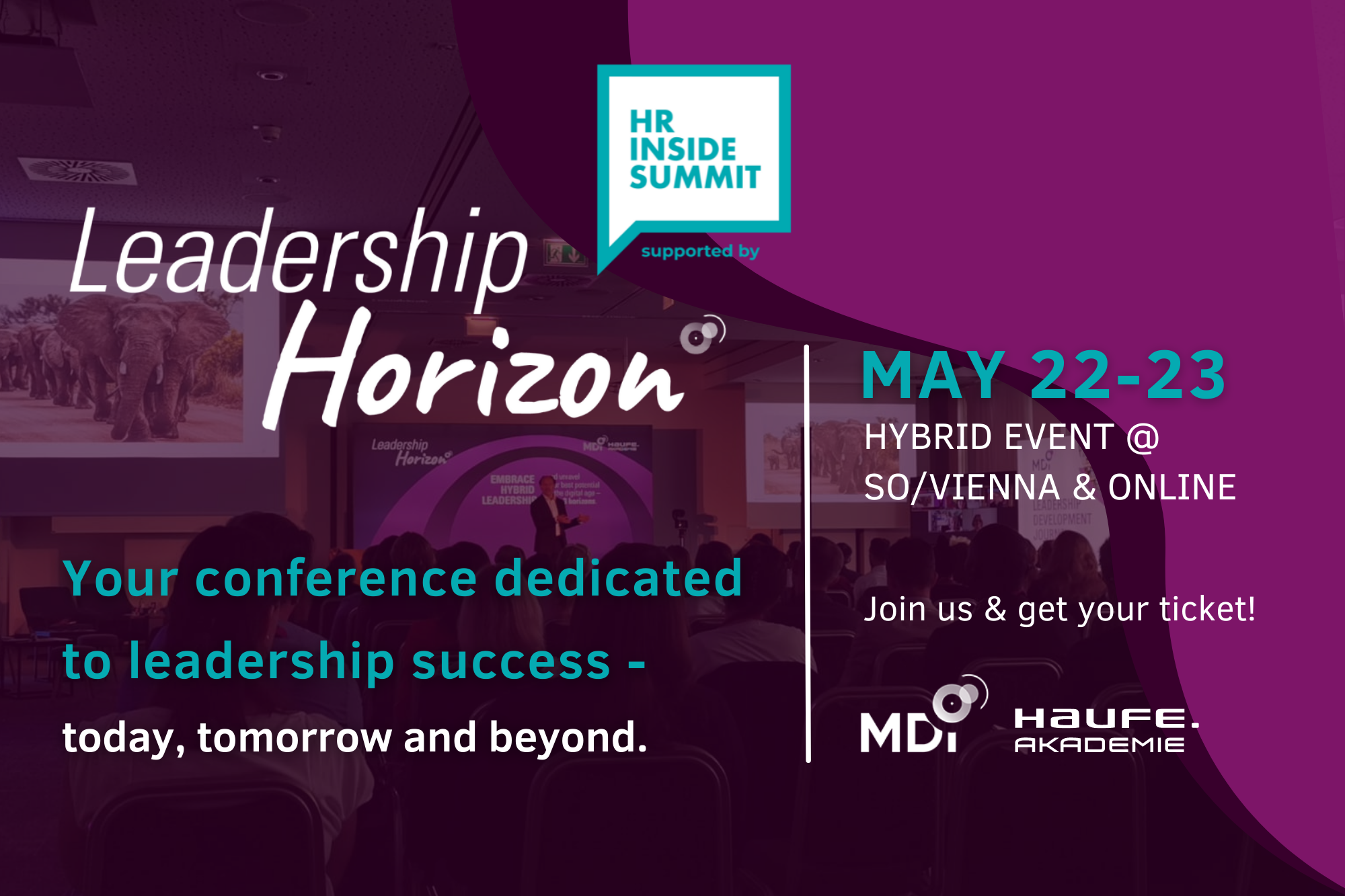
Leadership Between Connectedness and AI – A Conversation with Hamza Khan
Leadership between Connectedness and AI – A Conversation With Hamza Khan
Prefer to listen to the article? Click below to access our AI speech-generated audio. However, if you want to read it as usual, keep scrolling.
Leadership between Connectedness and AI – A Conversation With Hamza Khan
For another part of our expert series “Leadership 4.0: Leadership in the AI Era,” Leadership Horizon 2023 keynote speaker Hamza Khan agreed to an interview with us. He tells us about the skills needed in the age of artificial intelligence, recommends active action steps for leaders, and explains why, in his opinion, a pure leadership culture through robots is unrealistic.
Read this interview to gain insights and explore how artificial intelligence changes today’s leadership culture.
In the context of artificial intelligence, some people often worry about their jobs being replaced by AI. How do you see this concern? Especially, what then becomes the role of a leader when using AI?
The concern about AI replacing jobs is both valid and urgent. Undoubtedly, jobs will be changed and replaced by the end of the decade. These sentiments are shared by nearly every think tank and strategy consulting firm. For instance, Deloitte estimates that 100 million global low-wage workers must find a different occupation by 2030. McKinsey reckons that 400 million to 800 million individuals could be displaced by 2030.
But viewing AI as a tool that can augment human capabilities rather than replace them entirely is essential. Through this lens, leaders play a crucial role in shaping the narrative by ensuring that AI enhances employees’ skills and productivity.
The role of a leader in the AI era is evolving to that of a steward—one that must balance the dichotomy of leadership (serving the needs of the mission vs. serving the needs of the people). And I believe that what’s good for the mission is what’s good for people and, by extension, the planet.
To that end, leaders should focus on leveraging AI to automate routine and especially mundane tasks, freeing up time for strategic thinking, creative thinking, and fostering a culture of continuous learning and adaptability among their teams.
AI can be a game-change force multiplier for good. But suppose leaders repeat the mistake of using it as a tool to merely increase profitability at the expense of people and the planet. In that case, we risk accelerating civilization toward the opposite of the greater good.

For what purposes do you think AI can be best utilized in a professional context?
AI is exceptionally valuable for data analysis, decision-making, and process optimization. My rule of thumb for optimally using AI is to give it that which is measurable, repeatable, and scalable.
My tasks offload to AI include increasingly complex coding, extracting insights from vast datasets, written (and soon multimedia) content editing, improving forecasting accuracy, and enhancing user experiences.
Which tools are most suitable for leaders in that regard?
Tools like machine learning algorithms, natural language processing, and data analytics platforms are most suitable for leaders effectively leveraging AI.
What skills must a leader possess to successfully use AI?
My wife (who, by the way, will be presenting at the next MDI Leadership Horizon) and I playfully interpret the “GPT” in ChatGPT as “Genius Partner For Thinking.” In that regard, leaders can use AI to map the various decisions and consequences. They can use it to synthesize complex ideas. They can use it for creating briefs.
It helps to think of AI as a droid (like C-3PO from Star Wars) without a body (for now). But to successfully use AI, leaders need skills such as data literacy to understand AI-generated insights, critical thinking to interpret AI recommendations, and emotional intelligence to manage teams effectively.
And discipline to use regularly, communication to get the most, creativity to imagine solutions, and humility to recognize their limitations.
What technical skills are necessary?
While skills like basic programming and data analysis can be beneficial, the good news is that leaders can be something other than technical experts.
But they should nevertheless have a fundamental understanding of AI concepts. Specifically, at this game stage, they should become adept at prompt design and engineering.
Artificial intelligence technologies are evolving rapidly. How can companies ensure that they keep up with all the latest developments and make their AI strategy successful in the long run?
To stay current, companies should invest in continuous learning and development programs for their employees. This effort includes staying abreast of industry trends (via news, reading, conferences, etc.), training on AI technologies, and ethical considerations.
Establishing cross-functional AI teams and fostering collaboration between IT and business departments can also ensure a successful long-term AI strategy. And I think it’s also helpful to have fun with technology—play with it, challenge each other to push the limits of their creativity, and ultimately try to improve people’s lives and the planet’s health.
Before undertaking any new AI initiative, ask, “How could this support life?”

How realistic is it that a portion of our leaders in the future will consist of robots?
While AI systems may assist in decision-making, it’s unlikely that robots will entirely replace human leaders. True leadership involves empathy, intuition, and understanding complex human dynamics, which are difficult for AI to replicate.
With that said, it’s realistic that we’ll see the widespread assistance of human leaders by robots. And this includes, further down our timeline, the physical augmentation of humans.
What would such a leadership style look like? One that is solely based on Artificial Intelligence?
Here, we can get quite philosophical about what it means to be a human leader. After all, successful leadership is transmitted. And this presupposes that something is learned, taught, and replicated. Therefore, if humans can do it—and it’s measurable, repeatable, and scalable—then it’s not out of the realm of possibility that AI could do it.
A purely AI leader, I think, would make decisions faster, it would hold larger amounts of data and scenarios, and even perhaps make better decisions insofar as the criteria have been established to support life (for people and the planet).
But it would require bravery from humans to default to AI to lead them, to cast aside our anthropocentric worldview, and embrace AI as a new species—A wild notion for a species that has historically had a hard time accepting people with other intersectionalities as their own!
But back to the original question: leadership style solely based on AI would lack the emotional intelligence, creativity, and adaptability that human leaders bring.
What do you see as the advantages and disadvantages in this scenario?
AI can excel in data-driven decision-making, efficiency, and objectivity. Ultimately, it would excel in sheer computational output and productivity—we could accelerate scenarios, projects, and tasks to their logical conclusions.
However, it may lack creativity, ethics, and the ability to understand the nuances of human behavior and emotions. A misstep here could accelerate consequences not in the best interest of supporting life.
What aspects can be taken over by Artificial Intelligence, and what should remain human?
AI should take over anything routine that can be done better, faster, or cheaper. But the caveat should be that surplus gains from labor should be used to offset losses incurred by humans.
This process could be achieved through such initiatives as universal basic income, subsidized upskilling and reskilling, and robust social welfare programs, to name a few. While decisions related to strategy, ethics, and employee well-being should remain human-driven.
At the same time, we need to start thinking ahead of the time when AI will gain sentience, at this point, we’ll have to be careful about thinking it as a tool.

Now that we’ve talked so much about artificial intelligence – what specific initial steps can companies/leaders take?
Start with small, manageable AI projects that solve specific problems. Start playing with the technology, use it more frequently, empower others to do so, and involve the entire organization in this endeavor.
Invest in employee training and AI literacy. Develop clear AI ethics guidelines to ensure responsible AI use. And encourage a culture of experimentation and learning.
How can we gradually integrate AI into our daily work routine?
To bring AI into your daily work routine, pick tasks that could use digital help. Ensure you’ve got the right data at your fingertips, and then find some AI tools that make sense for your goals.
Get your team on board by giving them a crash course in AI, so they’re on the same page. Test the waters with small pilot projects, tweaking things as you go along. Encourage everyone to work hand-in-hand with AI, where people bring the human touch, and AI brings the data smarts.
And don’t forget the ethics—set some clear rules for how AI should behave. If it all works out, consider rolling it out to more parts of your organization. Keep an eye on things, gather feedback, and ensure everyone’s still on board. Create a culture where AI is just another team member, with leaders who’ve got its back.
I have one last question that we will ask all our guests. What do you see as the biggest challenge for leaders in the next 5 years?
This is an excellent question to end with which to end our interview. I’m excited to revisit my answer in a year, as it might require substantial updating, given the exponential growth of the technology.
For now, one of the biggest challenges for leaders in the next five years will be navigating the evolving landscape of technology, AI, and sustainability while focusing on human well-being, planetary well-being, and ethical practices. Balancing these priorities will require adaptability, compassion, and visionary leadership.
It will require transcending our humans’ hardwired fear of change and a coordinated orientation toward using leadership to serve the greatest good: life.

Hamza Khan
Keynote Speaker
Hamza Khan is a best-selling author, award-winning entrepreneur, and globally-renowned keynote speaker whose TEDx talk “Stop Managing, Start Leading” has been viewed over two million times.
The world’s leading organizations trust him to enhance modern leadership, inspire purposeful productivity, nurture lasting resilience, and navigate constant change.







